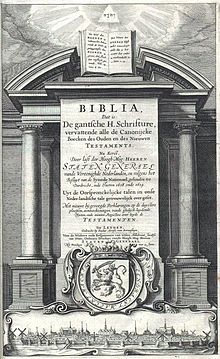Statenvertaling
Bible translation in Dutch language From Wikipedia, the free encyclopedia
Bible translation in Dutch language From Wikipedia, the free encyclopedia
The Statenvertaling (Dutch: [ˈstaːtə(ɱ)vərˌtaːlɪŋ], States Translation) or Statenbijbel (States Bible) was the first translation of the Bible from the original Hebrew, Aramaic and Greek languages into Dutch. It was ordered by the Synod of Dordrecht in 1618, financed by the government of the Protestant Dutch Republic and first published in 1637.[5]
| De Statenvertaling | |
|---|---|
 Title page of the original 1637 Statenvertaling. | |
| Full name | BIBLIA, Dat is: De gantsche H. Schrifture, vervattende alle de Canonijcke Boecken des Ouden en des Nieuwen TESTAMENTS. |
| Other names | Statenbijbel |
| Language | Dutch |
| Complete Bible published | 1637 |
| Apocrypha | Ezra 3, Ezra 4, Book of Tobit, Book of Judith, Book of Wisdom, Sirach, Book of Baruch with Letter of Jeremiah, Additions to Esther, Additions to Daniel, 1 Maccabees, 2 Maccabees, 3 Maccabees |
| Authorship | OT: Johannes Bogerman, Willem Baudartius, Gerson Bucerus NT and apocrypha: Jacobus Rolandus, Hermannus Faukelius, Petrus Cornelisz, Festus Hommius, Antonius Walaeus |
| Revision | Ravesteyneditie, Jongbloededitie,[1] GBS-Bijbel,[2] Statenvertaling-1977,[3] Herziene Statenvertaling[4] |
| Publisher | Machteld Aelbrechtsdochter |
| Copyright | Public domain due to age |
| Religious affiliation | Dutch Reformed Church |
| Webpage | herzienestatenvertaling |
In het begin schiep God de hemel en de aarde. De aarde nu was woest en leeg, en duisternis lag over de watervloed; en de Geest van God zweefde boven het water., En God zei: Laat er licht zijn! En er was licht.[lower-alpha 1] | |
The first complete Dutch Bible had been printed in Antwerp in 1526 by Jacob van Liesvelt.[6] Like other existing Dutch Bibles, however, it was merely a translation of other translations. Furthermore, the translation from Martin Luther was widely used, but it had a Lutheran interpretation. At the Synod of Dort in 1618/19, it was therefore deemed necessary to have a new translation accurately based on the original languages. The synod requested the States General of the Netherlands to commission it.[7]
The Statenvertaling was written with specific guidelines for translation established by the synod during its 8th session on 20 November 1618. The four main instructions to the translators were:[8]
Regarding the Biblical apocrypha, the synod decided to translate these books but not to make them part of the canon. They were placed after the books of the New Testament and preceded with a "warning for the reader".[9]
In the Hebrew Bible, God's name is written with the four consonants JHWH (as seen on the very top of the title page in Hebrew characters), and would not be pronounced by the Jews. During the 12th session, the synod decided to translate God's name with "HEERE" ("LORD"). In the margin where God's name first appears, the following note is given:[10]
Na de voleyndinge van het werck der scheppinge/ wort hier aldereerst Gode de naem van IEHOVAH gegeven/ beteeckenende de selfstandigen/ selfwesenden/ van hem selven zijnde van eeuwicheyt tot eeuwicheyt/ ende den oorspronck ofte oorsake van het wesen aller dinge; daerom oock dese naem de ware Godt alleen toecomt. Onthoudt dit eens voor al; waer ghy voortae het woort HEERE met groote letteren geschreven vindt/ dat aldaer in 't Hebr. het woort IEHOVAH, oft korter/ IAH staet.
(After the completion of the works of creation/ here for the first time God is given the name IEHOVAH/ meaning the independent/ self being/ being the same from eternity to eternity/ and the origin or cause of existence of all things; that is why this name only belongs to God. Remember for all time; wherever you from now on see the word LORD written in capital letters/ that there in Hebr. the word IEHOVAH, or shorter/ IAH is stated.)
The 1657 English Version owed itself to the close contact between the Puritans in Holland and England. In 1646 the House of Lords in England commissioned Theodore Haak (1605-1690) a respected German polyglot and academic to begin work on an English translation of the Statenvertaling met Aantekeningen – the Dutch State Bible.[11] There is a suggestion that the Westminster Assembly initiated the project in 1645, but there is no evidence that the Westminster Assembly discussed the matter in that year.[12] Charles Spurgeon, a Calvinist Baptist, wrote: "Haak's Annotations come to us as the offspring of the famous Synod of Dort, and the Westminster Annotations as the production of a still more venerable assembly; but if, with my hat off, bowing profoundly to those august conclaves of master minds, I may venture to say so, I would observe that they furnish another instance that committees seldom equal the labors of individuals. The notes are too short and fragmentary to be of any great value. The volumes are a heavy investment."[13]
Seamless Wikipedia browsing. On steroids.
Every time you click a link to Wikipedia, Wiktionary or Wikiquote in your browser's search results, it will show the modern Wikiwand interface.
Wikiwand extension is a five stars, simple, with minimum permission required to keep your browsing private, safe and transparent.